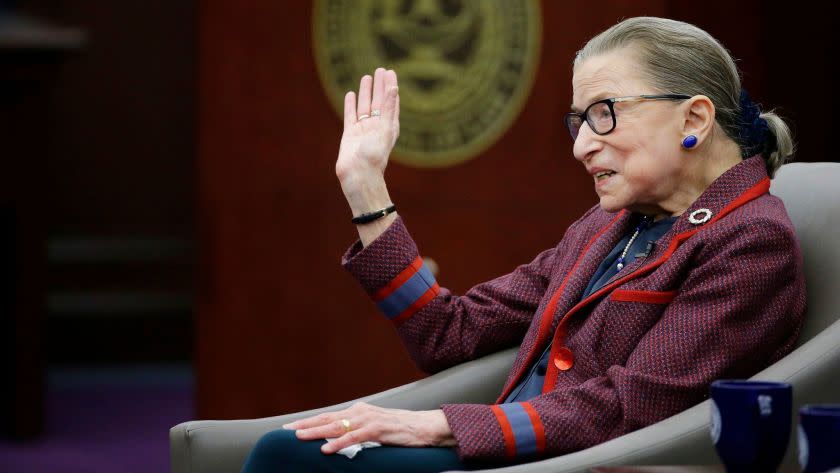Letters to the Editor: Ruth Bader Ginsburg could have saved us a lot of worry before 2016

To the editor: Supreme Court Justice Ruth Bader Ginsburg, a heroine among feminists, likely did a great disservice to women by remaining on the bench before Donald Trump was president despite her long history of fighting cancer. ("What would Mitch McConnell do if Ginsburg's seat became vacant? You know perfectly well," Opinion, July 18)
In 1999 she was diagnosed with colon cancer, then 10 years later she received her first diagnosis of pancreatic cancer. Lung cancer followed in 2018, and recently the disease was found in her liver.
Given that Ginsburg has been one of the most important supporters of women's rights of her generation, I often wonder why didn't she retire under the Obama administration, when the likelihood of being replaced by someone with similar priorities was quite possible.
I wish Ginsburg well, but it is unsettling now to have to worry about her deteriorating health, women's reproductive rights and the possibility of a new justice who might reverse years of gains.
Berta Graciano-Buchman, Beverly Hills
..
To the editor: I share columnist Nicholas Goldberg's deep concern regarding Senate Majority Leader Mitch McConnell's (R-Ky.) publicly stated and Machiavellian intention to seat a Supreme Court justice up to and including Nov. 3. I pray daily for the health and recovery of Ginsburg.
However, might there be an escape hatch if Goldberg's and many others' palpable fear comes to be? What if there is a third-quarter or even fourth-quarter Supreme Court vacanacy?
The final step to being appointed onto the court is a formal investiture ceremony during which the chief justice administers the judicial oath. Chief Justice John G. Roberts Jr. could, ostensibly, delay or outright refuse to administer the oath citing "precedent" (albeit congressional or legislative versus judicial) — that is, McConnell's own precedent of refusal to permit the Senate even to hold hearings on President Obama's nominee, Judge Merrick Garland.
Ged Kenslea, North Hollywood
